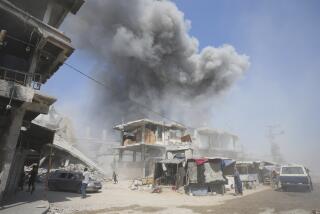Croatian Troops Seize Strategic Route to Sea
- Share via
BELGRADE, Yugoslavia — Croatian troops surged across a U.N.-monitored cease-fire line Friday to seize a strategic route to the Adriatic Sea that had been blocked by Serbian rebels for more than a year.
The Croatian offensive, quickly condemned by the Security Council, posed the most serious threat to a U.N. peacekeeping mission in Croatia since foreign troops were deployed last April to separate warring Serbian and Croatian militias.
Renewed Serbian artillery assaults on the two largest cities in Bosnia-Herzegovina--Sarajevo and Mostar--were also reported Friday, casting further doubt on claims by Western mediators that progress was being made toward a negotiated settlement of the bloody Yugoslav conflicts.
Peace talks are to resume in Geneva today. But the escalating violence among the Balkan combatants intensified fears that the negotiating forum is being used as a shield to stave off Western military intervention in Bosnia while Serbian and Croatian forces continue armed offensives.
The incursion of Croatian troops into the U.N.-patrolled area near the Adriatic port of Zadar was reportedly triggered by Zagreb’s frustration with stalled talks with Croatia’s rebel Serbs on rebuilding the Maslenica bridge on the main route linking central Croatia with the coast. The bridge was destroyed in 1991, when Croatia’s Serbian minority rebelled against the republic’s declaration of independence from Yugoslavia.
“They have told us they want to secure the Maslenica bridge and the area around it because they are exasperated with Serb delays with regard to reconstruction of the vital bridge,” said Cedric Thornberry, chief of civilian affairs for the 23,000-troop U.N. deployment in Croatia and Bosnia.
The Croatian leadership under President Franjo Tudjman has become increasingly frustrated in recent months over what it sees as the failure of the U.N. peacekeeping mission to restore peace and security to vast areas of Croatia seized by the Serbs and protected from Croatian reprisals by the U.N. presence.
Tudjman had already warned U.N. officials that the peacekeepers’ mandate, due to expire in March, would not be renewed unless the foreign troops made serious progress toward disarming unruly Serbian rebels and allowing non-Serbs they expelled from the seized territory to return home.
The offensive shattered a cease-fire that had been relatively stable since Croatia and the rump Yugoslavia agreed to it last year. It also raised fears of a renewal of the Serbo-Croat war that claimed 10,000 lives in 1991 and left hundreds of thousands homeless.
Backed by the Yugoslav army, Serbs, who made up 12% of the 4.7-million population of Croatia, conquered and occupied nearly one-third of the republic’s territory before agreeing to the U.N.-drafted peace plan that has served to secure their land-grab.
Belgrade radio said several French peacekeepers were wounded in the fighting at Zemunik’s airport. The report could not be independently confirmed.
U.N. officials said hundreds of refugees were fleeing artillery and mortar barrages in the area. “We are in a very dangerous situation,” a U.N. official said. “We are now at a turning point--either toward peace or toward total war.”
Serbian commanders in Krajina, the self-proclaimed Serbian state in Croatia, immediately announced a general mobilization. Goran Hadzic, Krajina’s Serbian leader, ordered troops to be ready to respond to “the armed aggression of Croat forces against his republic,” the Belgrade-based news agency Tanjug reported.
Serbian fighters later paraded tanks around Knin, the mountain stronghold of Krajina, as town residents applauded, the radio said.
Under the peace plan of U.N. mediator Cyrus R. Vance, Serbian militias were supposed to disband and hand over their weapons to U.N. supervision to create demilitarized zones. But the Serbian fighters have refused to give up their arms, prompting the Croatian government to accuse the United Nations of bungling and interference.
Yugoslav President Dobrica Cosic sent a protest letter to the Security Council, warning that the federal army would intervene to protect Croatian Serbs if the U.N. peacekeepers failed to turn back the Croatian offensive. “The Federal Republic of Yugoslavia has both the right and duty to protect the Serbian people, which it will undoubtedly do, if the U.N. Protection Force fails to do so,” he wrote.
It was on the strength of the Yugoslav army’s involvement in the 1991 war in Croatia that the rebel Serbs succeeded in conquering so much Croatian territory. Serbian rebels have also vanquished 70% of Bosnia, again largely due to the troops and weapons supplied by Belgrade.
Lt. Gen. Satish Nambiar, commander of the U.N. Protection Force in Croatia and Bosnia, told the internal U.N. radio network that Serbian forces had already broken into stockpiles of heavy weapons under U.N. surveillance and made off with the hardware.
Meanwhile, fighting was reported throughout neighboring Bosnia, where rebel Serbs agreed to a general U.N. formula for peace on Wednesday but have continued to blast away at coveted territory. Sarajevo radio said the old town center of the besieged Bosnian capital came under heavy shelling by Serbian forces from the surrounding hills.
In eastern Croatia, a Russian peacekeeper was killed when he stepped on a land mine. He was the 24th U.N. soldier killed since the mission began nine months ago.
Times special correspondent Silber reported from Belgrade, and Times staff writer Williams reported from Geneva.
More to Read
Sign up for Essential California
The most important California stories and recommendations in your inbox every morning.
You may occasionally receive promotional content from the Los Angeles Times.














